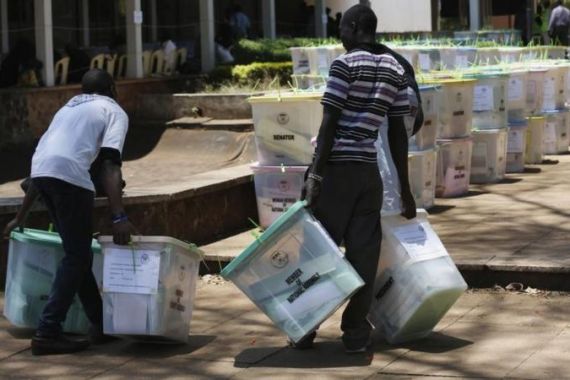Vote setbacks raise concerns over Kenya race
Widespread technical failure and thousands of spoiled ballots have fuelled complaints of voting irregularities.

Election officials from across Kenya are travelling to Nairobi to deliver election ballots manually after the widespread failure of the country’s new electronic voting system, leading to criticism of the country’s complex voting rules.
Following the technical difficulties, the Independent Electoral and Boundaries Commission (IEBC) said it would count votes manually in a national tallying centre overnight.
It said it hoped to declare the winner on Wednesday and urged Kenyans to remain calm in anticipation of election results.
About 330,000 ballots were initially rejected for not following election rules, however the IEBC announced on Tuesday that those spoiled ballots will count in the overall vote total.
The commission’s decision makes it very difficult, given the tight race, for either leading candidate to reach the 50 percent mark needed to win outright, raising the prospect of another round due within a month after the vote.
As of 8:15am (05:15 GMT) on Wednesday, Uhuru Kenyatta – the country’s deputy prime minister who also faces an international trial for alleged crimes against humanity – had won just over 2.79 million, or 53 percent of valid votes cast against rival Prime Minister Raila Odinga with 2.20 million, or 42 percent.
Kenya’s 2010 constitution – passed after 2007-08 election violence killed more than 1,200 people – says a candidate needs “more than half of all votes cast in the election” to win the presidency outright or the election will be determined in a second round.
Widespread failure
There have been multiple complaints at the widespread failure of electronic biometric voting registration (BVR) kits introduced by the IEBC to frustrate potential rigging.
The BVR failure meant stations had to resort to paper records and manual registration, which considerably slowed down the voting process.
Kenyatta’s Jubilee Coalition called on the IEBC to “urgently remedy the technical issues” affecting the vote, saying it was concerned at the slow progress.
Kalonzo Musyoka, Kenya’s vice president and Odinga’s running mate, told reporters they were also worried about “the huge numbers of spoilt votes”.
Ahmed Issack Hassan, IEBC chairman, said the body was looking into complaints of voting irregularities from political parties, and acknowledged the spoilt ballots were a “concern”.
“I want to assure the candidates and political parties, please don’t jump to conclusions: your job is to contest the election, our job is to organise them,” Hassan said.
The results of the 2007 poll, which President Mwai Kibaki won against Odinga, were criticised for a lack of transparency in the way the votes were counted, helping to spark a wave of deadly violence in which more than 1,200 died.
Odinga and his rival Kenyatta – the son of independent Kenya’s founding president – have vowed repeatedly there will be no repeat of the 2007-08 bloodshed.